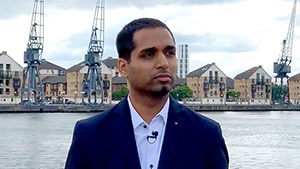This will be India’s century in tech leadership: TLA founder Russ Shaw

For the UK’s rapidly evolving tech sector, the numbers are big. Equally at stake is the share that global technology ecosystems will hold. India, and Indian tech companies, are expected to play a key role on what is a two-way street. “UK tech can keep growing. Let’s build the connections into India. It’s a win-win for both,” Russ Shaw, who is the Founder of Tech London Advocates, tells HT.
“Let’s get British companies to set up in India” is the clear message. Tech London Advocates, which is best described as a network of tech leaders, experts and entrepreneurs, isn’t just restricted to the UK. They have a presence in more than 70 countries, including a hub in India, with the aim to enable global tech partnerships.
Shaw wears many hats. He is also an angel and venture investor, founding partner of London Tech Week, a London Tech Ambassador for the Mayor of London and Advisory Board member for Founders4Schools and the Government’s Digital Skills Partnership as well as a Trustee for Modern Muse Charity for young women who want to study STEM subjects.
India’s use of technology, particularly digital identification and transitioning millions to owning bank accounts over the past few years, has amazed Shaw. Numbers put a perspective.
The latest government of India figures, as of April this year, peg the Pradhan Mantri Jan Dhan Yojana (PMJDY) account beneficiaries at 49.12 million, with the cumulative balance in these accounts pegged at ₹2,01,598.79 crore. “Everybody’s got a digital banking account, and 500 million have moved from being unbanked to banked. I think that is remarkable,” says Shaw.
Tech London Advocates are bullish about India’s path towards tech inclusivity. “I haven’t really seen that to such a degree and many other places around the world. India’s got really good talent. You’ve got a foundation of giving access to virtually everybody for digital and tech,” Shaw points out. “I think India will be a world leader in advanced manufacturing in addition to software. You will have a full stack to mirror the India stack,” he says.
Indian start-ups are expected to take advantage the unfolding chapter in the India and UK trade partnership too. According to Nasscom’s latest data, India has become the third largest tech start up ecosystem in the world, after the US and China.
Shaw argues that there are global cycles, and we are at the cusp of another such change. “We’ve talked about the American Century and the Chinese century. I think this century is going to be the Indian century,” he says. Numbers lend credence to Shaw’s argument.
India added 23 unicorns in just 2022. In comparison, in the last decade, 134 tech unicorns emerged in the UK. In start-up parlance, a unicorn is one that’s valued at more than $1 billion. On a broader scale, it is expected that Indian and UK tech companies, particularly in the climate tech, sustainability, cyber security, e-commerce and fintech spaces, will see increased synergy.
Also read:Building in India is the way to make an impact: Jay Vitale, CEO of Air For Life
Venture Intelligence data lists ed-tech platform Byju’s, food and grocery delivery app Swiggy, logistics company Delhivery, fintech Cred, and online gaming platform Dream11 as some Indian unicorns.
There is appreciation for the fact that overseas talent has helped the UK’s tech industry, over the years. It has breached the $1 trillion valuation for the tech sector, becoming the third country to do so after the United States and China.
“During 2022, fast-growing UK tech companies raised near-record levels of funding at £24 billion,” Secretary of State for Business and Trade Kemi Badenoch said while launching the global tech awards during the London Tech Week. Some of the now leading global tech companies such as DeepMind, Graphcore, and Darktrace, are based in the UK.
Why has London punched above its weight as a tech hub over the past few years? “It’s because of the mix of people here. A few years ago, one-third of our tech ecosystem in London was from people from overseas. It’s that mix it’s the knowledge transfer from overseas to the UK and back that has really created a strong tech hub,” says Shaw.
He points to the example of foreign exchange fintech Wise, formerly TransferWise. “We’ve got two Estonian guys who came here, set up TransferWise and now Wise, which is probably the most successful listing on the London Stock Exchange,” he says.
While London has over the years maintained its strong position as a fintech hub globally, there are emerging themes. Artificial intelligence (AI), augmented reality (AR), health tech and clean tech are some focus areas which have been prominent during this year’s London Tech Week. The announcement by UK’s Prime Minister Rishi Sunak, confirming the country’s intentions to proceed with much-needed regulation for AI, will give the country a prominent position.
“Clearly AI and data are focus areas now,” says Shaw. “We can do a lot more on climate tech and sustainability.” Cybersecurity and the auto industry are two areas where there is increased interest and intent to invest as well.
UK’s intent to regulate AI comes with the backdrop of UK’s Financial Conduct Authority or FCA, which regulates the burgeoning fintech space in the country. “We know how to do regulation. I think that’s a good competitive advantage where the UK can carve out something with the UK and the US, India and EU,” believes Shaw.
According to Shaw, by the year 2030, India’s tech ecosystem will be the largest in the world – followed by China, the US and the UK. “The largest and the fourth largest ecosystems, working together, having talent move back and forth between the two and having businesses expanding each other’s markets, will grow the Indian market and the British market. That to me is the opportunity here,” says Shaw. His advice to any UK business looking to go global, is to go to India.

Atul Tiwari is a seasoned journalist at Mumbai Times, specializing in city news, culture, and human-interest stories. With a knack for uncovering compelling narratives, Atul brings Mumbai’s vibrant spirit to life through his writing.






